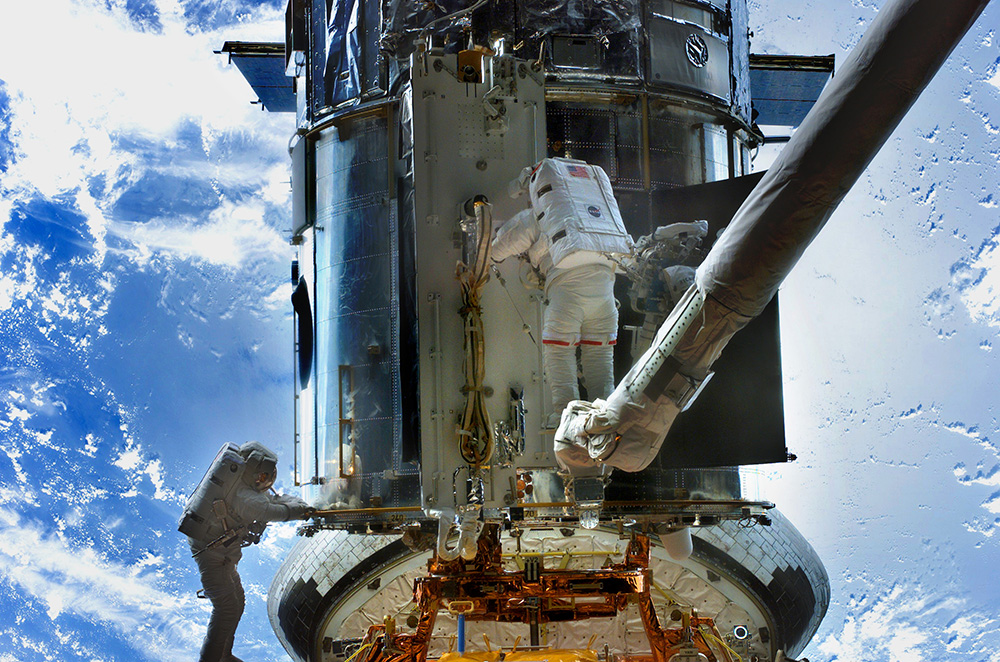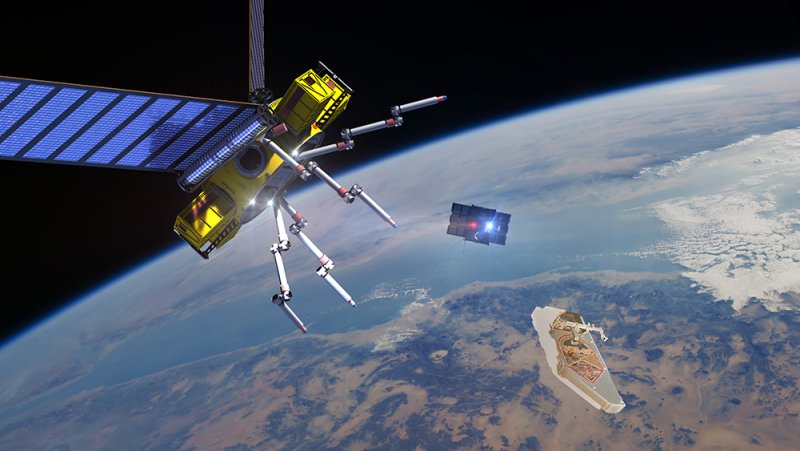
Installation of the Creare Cryogenic Cooler on the Hubble Space Telescope. Courtesy photo.
Just ask the man who played Captain Kirk, space really is the final frontier. William Shatner made a big splash when he actually went to space aboard a Blue Origin New Shepard rocket in October. NH’s aerospace and defense manufacturers are ready to ride the rocket of the new and burgeoning commercial space market.
“It is divergent but very aligned with the expertise and capabilities of these firms, which makes it easy to explore new opportunities in space,” says William Bates, executive director of the NH Aerospace and Defense Export Consortium (NHADEC).
Data from firms such as Bryce Tech, which specialize in comprehensive insight and expertise on the space economy, predict the industry will double by the end of the decade.
“It’s about a $460-billion industry today, and by 2030, they say it will be over $1.3 trillion,” says Bates. “That is a mind-numbing number, how could a sector amount to that? It’s because commercial space has come into its own and is driving a lot of new business.”
One of the big space programs is the Artemis mission to go back to the moon in 2025. “It is not just to get there but to go and develop a permanent moon base. That is way different than spending a week. There is a lot to develop and produce, and that is what is driving business now,” he says.
If you separate the space economy, and only look at new investment, in 2020, there was $7.6 billion invested in space startups. “Some of the startups are familiar, such as SpaceX that garnered 30% of the investment, but there are many smaller companies we’ve never heard of,” says Bates. “They are being supplied by companies here in New Hampshire, working on widgets, sensors, systems and subsystems, and finished satellite products that will be used in space.”
The most recent data, which is pre-pandemic, shows that more than 400 companies in NH worked on programs and projects in the aerospace sector. While the U.S. is a leader in the sector, the export opportunities are booming as well.
“There is a march toward creating new launch centers around the world,” says Bates. “The UK has three and they are adding two, and that is a small country. Brazil has the Alcântara Space Center, approved for U.S. launch with four or five American companies using it. The Australian space agency is growing. Ongoing discussions with the UK potentially create opportunities for our members as does the Indian Space Research Organisation.” He adds that Russia and China are expanding their space programs as well, but there is a reluctance by members to go too fast toward opportunities there because more than 70% work on defense projects, making deals with space programs in those countries a highly sensitive issue.
Among the 100 members and partners of NHADEC, 52 manufacture products or components, or provide services used in space-related projects, says Bates.
Jewell Instruments makes sensors used to test items that go into space. Aerodynamics in Seabrook provides metal finishing for rockets (SpaceX is a customer). Rogue Space Systems in Laconia develops AI-enabled proprietary technology that will go into low-earth orbit to inspect, deploy and retrieve satellites. Creare, an engineering innovation company in Hanover, has won several Small Business Innovation Research awards to help NASA innovate and solve problems related to spacecraft, systems or components that must work in a harsh environment.

Rogue Space Systems’ Fred Orbital Transport Vehicle. Courtesy photo.
A two-day set of meetings in December, with NASA and its prime contractors, will give NHADEC members a chance to explore opportunities and make a presentation to be considered as a future supplier.
“This is such a growth opportunity, whether it is low-earth orbit, satellite constellations or private human space flight, which is going to be very popular as the price comes down. This is all exciting stuff,” says Bates. “There are new frontiers, and new business for our member[s].”
